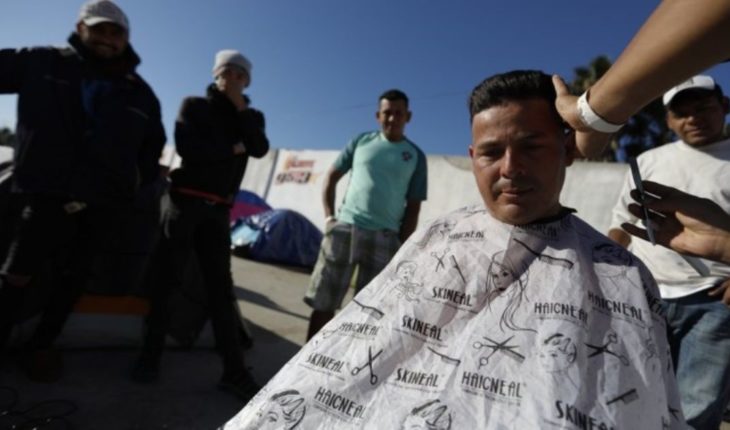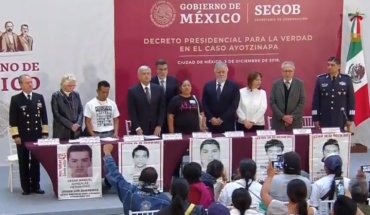border Tijuana.-before dawn each morning, migrants out of a shelter in Tijuana near the border with the United States to go to their jobs in other parts of the city. Moving alone or in pairs, are easy to recognize by the particular passage of a person who has to get out. Leaving the Sun, another crowd is gathered in a corner near the shelter waiting for job opportunities. A few days ago, a dozen of migrants went to the back of a pickup with such enthusiasm that tore off a smile to the driver. Migrants did not know where they were going or when they return, some wore your sleeping bag, but they said they were going to work peeling tomatoes. Facing a wait of several months in Tijuana before even having the chance to ask for asylum in the United States, many migrants began to seek employment. Others who had already decided to stay in Mexico, have requested, and in some cases received, permission to work in Mexico. It is something that Mexican authorities have encouraged migrants to make in the hope that employment help them take root in the country instead of crossing to the United States.
In the majority of cases, the migrants feel relieved to have something to remove them from the conditions of misery in the crowded shelter, where the hours are very long, and put them some money in their pockets. “Here you win your money,” said Nelson David Landaverde, a 21 year old Honduran who went out to look for food with his 16-month-old son when someone approached him to ask him if he wanted to work in a car wash. He did not think it twice. He and his pregnant spouse scored their names on a list of informal of thousands of potential applicants for asylum in the United States, but, meanwhile, is eager to earn income that make her life a little easier in Tijuana. His new job pays around 75 cents per car, and wash about 10 cars on good day hopes to take home an amount superior to the minimum wage, which in Mexico is less than 5 dollars a day. Although authorities already closed the hostel near the border and relocated many of the migrants in other much more distant, hundreds of people have refused to leave first and have a camp outside of the enclosure. The reason is that many have found employment nearby. Marco Rosales, a Honduran immigrant who has lived in Tijuana for eight years, was on a street surrounded by other Central American migrants who asked a Labour Council.
“Here does not come with the mentality of Honduras”, said. “Here is a new country, a new State where you can change if you want to change”.
That morning only had space for a handful of people so that they will work in another nearby car wash, but I was sure that could later help more people who were willing.
Photo: File reform.
“I’m trying to communicate to them that doing things right we are going to move forward,” he said to be questioned why exhorted them to work rather than joining them on their way to the border. “If we do things wrong will not go anywhere. If they are wanting to do a March to close the line (border), it won’t get anywhere”. Migrants gathered in an office in the center of the city to begin the paperwork to apply for temporary visas in Mexico that allow them to work legally. Once they receive your number of identification on the part of Mexican authorities, they may meet with recruiters from assembly plants, where there is better wages and there are always vacancies available. The authorities of the State of Baja California said they have identified thousands of jobs that migrants could apply for. Fernando Hernández said that he came to Tijuana just a day, but was there to find work while waiting for an opportunity to enter United States.
“If we go, we go, but if not, have to work while”, said of 24-year-old who worked at stores in his native Honduras.
Attendance at a fair of the employment created to help the migrants find work has increased since the March of 25 November on the border with the United States that triggered a chaos when several migrants entered territory American and border agents responded by firing tear gas into Mexico. Before the protest, some 100 migrants only had a day, that figure has risen to more than 400 since then.
Photo: File reform.
Among those who have taken advantage of employment opportunities in the city is carnal Jared, who impetuously walked in half light through the streets of downtown Tijuana, protecting from cold with a windbreaker and a red Baseball Cap. The young 23 a native of Tegucigalpa, Honduras, not even saw people who chatted at the entrance of the bars, or who were on the sidewalk. Carnal a broth of beef offal was heading to the other side of the city, a Mexican food restaurant specialises in often. I didn’t even know the name of the street or the colony that the restaurant was located, but was memorized the way. He waited for 10 minutes at the corner of a 7 – Eleven to that happened a passenger truck, letting several buses to save 3 pesos (15 cents) and deal with the cheapest. Fleshly in Honduras was driving a truck, said that transportation in Tijuana is almost two times more expensive. After a journey of 15 minutes, Carnales stepped out of the vehicle in a neighborhood located on a hillside and started walking. On the other side of the restaurant, it was the steel door of one of the many that exist in Tijuana. Since arrived a couple of days before the caravan, young spent their first nights in that place. It was like he found a job in the restaurant. He left belongings commissioned in the hostel while he went out to work. A Guatemalan couple who met on the long road to Tijuana kept him a place to sleep under a tarp at the refuge near the border, but always carried their bags with them.
Photo: File reform.
There was much activity in the restaurant at 6 a.m. Workers were struggling to position itself opposite the mirror to adjust their uniforms and arrange the hair. In the background are listened pop music as Carnales pulled his work shirt and placed a red head. He stood in a corner of the kitchen and began to remove entrails from a tray. I soaked them in water, hung them to dry, and extended them over the counter. Carnal took time thinking about leaving Honduras, but was the caravan which gave him his first opportunity. He said that he wanted to get to the United States to work and help his mother and brothers at home, but for the moment, you will have to settle for Tijuana.
“There is work here,” said. “I spend here one time and then go to there.”
In this note:





